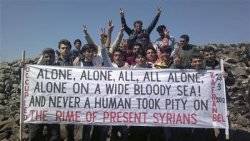Syrian forces pounded the battered city of Homs with tank and mortar fire and troops pummeled several other rebel strongholds, leaving at least 24 dead, opposition activists have said.
With the bloodshed showing no signs of abating, the UN-Arab League peace envoy for Syria, Kofi Annan, flew to Moscow on Saturday, seeking Russian backing for his efforts to secure a ceasefire.
Activists reported heavy shelling on Homs' Khalidiyah neighborhood and the city’s old districts in an attempt by the government to regain control of opposition-stronghold pockets.
In al-Qusair town of Homs province, an activist network said the government’s military campaign was continuing for a fourth day. The Syrian Revolution General Commission said the shelling had left several homes ablaze and thick smoke filled the sky.
Government forces backed by tanks have stormed a northwestern town in Idlib province amid intense shelling, another activist network said.
The Local Co-ordination Committees said troops, accompanied by scores of pro-government gunmen known as shabiha, were raiding homes and detaining people in Saraqeb, a town that has been held by the armed opposition for months.
Security forces also pressed ahead with a siege of Hama which they began two weeks ago, the UK-based Syrian Observatory for Human Rights said.
At least 33 people were reportedly killed in violence nationwide on Friday, a day which saw mass anti-government demonstrations across the country.
The latest reports of violence came as Annan was due to travel to Moscow to meet Russian President Dmitry Medvedev and Sergei Lavrov, the Russian foreign minister, on Sunday, before continuing to China.
China's foreign ministry said on Saturday that it Annan's visit to the country would take place on Tuesday and Wednesday.
Hong Lei, a ministry spokesman, said Chinese officials would hold "in-depth discussions" with Annan.
"China views as important and supports Mr. Annan's mediation efforts," the spokesman said, adding that Beijing hoped the talks would lead to a "political solution to the Syrian issue... that is fair, peaceful and appropriate".
Both Russia and China have used their veto rights as permanent members of the UN Security Council to block efforts to condemn Syrian President Bashar al-Assad.
Annan, the former UN chief, will be carrying with him Assad's answer to a peace plan under which Syria could begin a "political transition" to a representative government, with no specifically defined role for Assad.
New evidence of 'abuses'
Moscow and Beijing backed a non-binding Security Council statement on Wednesday in support of the initiative only after making sure it contained no implicit threat of further action should Assad fail to comply.
The statement urged the Syrian government to implement "fully and immediately" Annan's peace plan.
The initiative calls for Assad to withdraw troops and heavy weapons from protest hubs, a daily two-hour humanitarian ceasefire, access to all areas affected by the fighting and a UN-supervised halt to all clashes.
In Geneva on Friday, a UN-appointed panel of human rights experts said it had new information on the defections of four brigadier generals from Syria and on doctors ordered to make patients unconscious during hospital visits by Arab League monitors.
The Independent International Commission of Inquiry on Syria told a news conference on Friday it has also received information that unrest outside known areas, including in the country's second-largest city, Aleppo, was becoming significant.
Commission member Yakin Erturk, a former UN investigator on violence against women, revealed that several significant military figures had recently deserted Assad's government.
"Since our second report, four brigadier generals have defected. And of course, others before. But the reason why this is important is because of indicating that high level defections are increasing," she said.
More pressure on Assad
Adding to pressure on the government, the EU on Friday agreed to sanction Assad's British-born wife Asma, along with his mother, sister and sister-in-law.
Diplomats in Brussels said EU foreign ministers had agreed an assets freeze and travel ban on the four women and eight other members of Assad's entourage.
Asma al-Assad, whose parents live in Britain where she grew up, cannot be barred entry to the country, British Foreign Secretary William Hague said.
"But given that we are imposing an asset freeze on all of these individuals and a travel ban on other members of the same family and the regime, we are not expecting Mrs Assad to try to travel to the United Kingdom at the moment."
Assad himself was targeted last May 10, along with his younger brother Maher and four cousins.
In a separate development, Janet Napolitano, the US homeland security department secretary, announced that Syrians in the United States would be allowed to stay beyond their visas and avoid the risk of returning to their violence-torn country.
"Conditions in Syria have worsened to the point where Syrian nationals already in the United States would face serious threats to their personal safety if they were to return to their home country," Napolitano said.
PHOTO CAPTION
Demonstrators gather during a protest against Syria's President Bashar al-Assad after Friday prayers in Kafranbel, near Idlib, March 23, 2012. REUTER.
Aljazeera


 Home
Home Discover Islam
Discover Islam Quran Recitations
Quran Recitations Lectures
Lectures
 Fatwa
Fatwa Articles
Articles Fiqh
Fiqh E-Books
E-Books Boys & Girls
Boys & Girls  Hajj Rulings
Hajj Rulings Hajj Fatwas
Hajj Fatwas














